Does ACC basketball have an identity crisis in football-first world of conference realignment?
Leonard Hamilton, now the oldest and most experienced of any men’s basketball coach in the ACC, slowly climbed a small platform to his seat behind a table last week and made the obvious joke. He was in Charlotte for the conference’s annual basketball media days, an event where he once felt ignored and overlooked, but now reporters gathered around to hear what he had to say.
“Everybody keeps talking about me being the elder statesman,” Hamilton, 75, said while gripping the table for balance. “They need to hand me some steps, and take care of the old man.”
He released a long audible sigh as he sat down, as if the trek from the hallway had worn him out, or as though his knees hurt. Hamilton, who began coaching at Florida State in 2002, is entering his 22nd season in the ACC. Virginia’s Tony Bennett is the league’s next-most experienced head coach, with 14 seasons in the conference, and only two others (Clemson’s Brad Brownell and Miami’s Jim Larranaga) have been around more than 10 seasons.
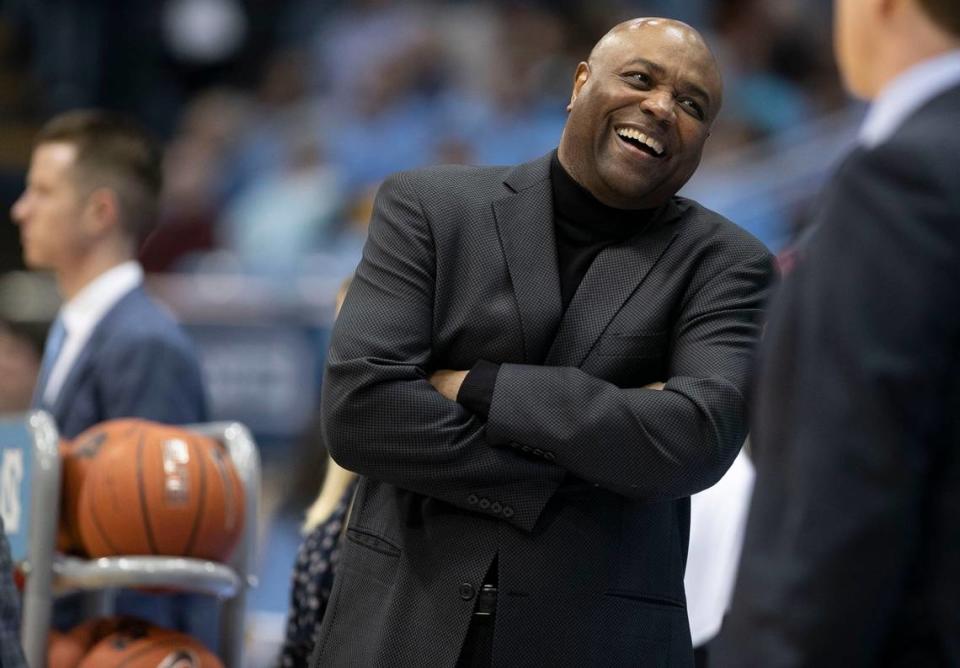
Among his peers, then, Hamilton is best-positioned to contextualize the evolution and state of ACC men’s basketball. There was a time, not all that long ago, when it carried a certain kind of mystique and gravitas. When the mention of “ACC basketball” conjured positive meaning and envy. It was a lot of things to a lot of people but, universally, it symbolized sustained greatness; the cultural and competitive peak — though Big East loyalists might disagree — of the sport.
And what is ACC basketball, now? The conference, even with its recent Final Four representation, is coming off of its worst two-year stretch in history. Its long-established identity has eroded. Its least-competitive teams (see: Louisville, last season, to start) have sunk to depths rarely, if ever, explored in the ACC. And now comes another round of expansion, with the impending additions of Cal, Stanford and SMU, that will further dilute the one sport that gave rise to the conference.
ACC basketball preseason gathering feels like the end of an era, in more ways than one
“I think that we all are resistant to change,” Hamilton said, and he went back in time, to the days of Georgetown’s John Thompson protesting the NCAA’s old academic requirements and the fight to change them; the debate, earlier in his tenure at Florida State, among his ACC peers about rounds of expansion that brought in Boston College and Miami and Syracuse and Pitt, among others.
“Some people were resistant to that,” Hamilton said, “and I think it only made our conference stronger. So we get the same thing with realignment now. We have some people that question it, but I think in the long run it’s all going to work itself out. ...”
He paused for a quick beat, as if to reflect. Here came some old-school Hamilton wisdom.
“I just adjust to what’s going on,” he said. “I’m not going to fight City Hall.”
Colossal changes in college basketball
As another college basketball season begins there’s a compelling argument that it will be the last of its kind in the ACC — the final season in which, with some squinting and some wistfulness, one might convince themselves that the ACC of old is still hanging on. Of course, one could argue, too, that ACC basketball died a long time ago. That what has endured in its place has been an impostor.
Either way, this is the final season of the ACC in its current construct. The final one in which the geographic boundaries of the conference still, loosely, make sense (despite the reality that three ACC members are in states that don’t, in fact, border the Atlantic Ocean). Next year will bring the arrival of two California schools and another, from Dallas, that will do little to address the long, slow decline of ACC basketball. One could forgive coaches for being less than enthralled.
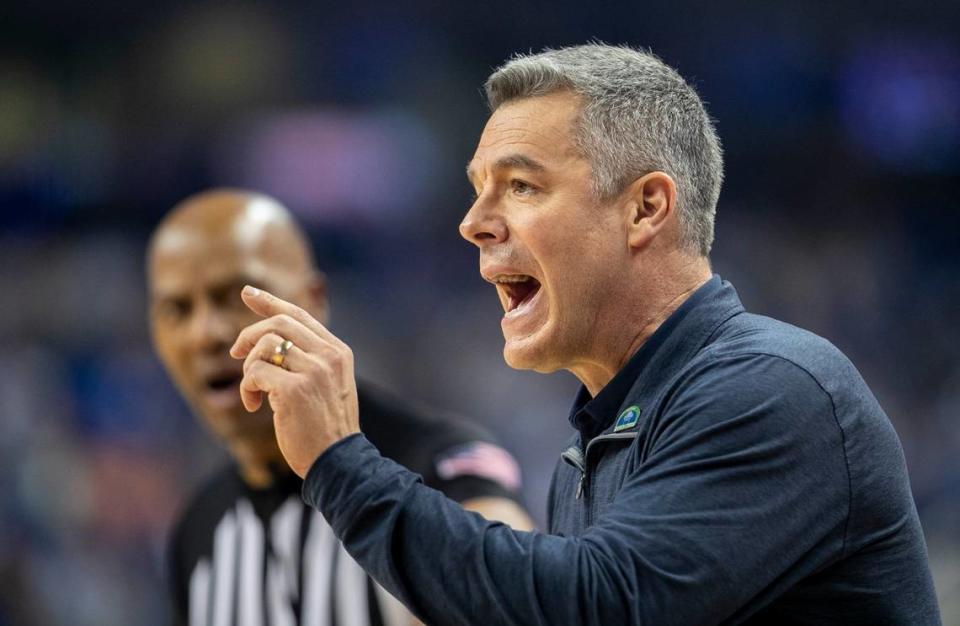
“It’s certainly changed,” Bennett said. “And again, I think most people would say you’d rather have it smaller, tighter and geographically sound, but it isn’t that way. So we’ve got to figure it out and make it work. I don’t know if those things are being talked about.
“But we could have a two-week conference tournament. I think that’d be fun.”
The sarcasm was warranted, perhaps, in a moment in which ACC basketball purists have had to laugh to keep from crying. There is little debate that what passes for ACC basketball today pales in comparison to what it was 10 years ago — let alone to what it was during the decades-long glory years from its founding in 1953 through most of the 1990s. Part of that is because college basketball, at large, has undergone a transformation during the same time.
The three- or four-year college standout went all but extinct, only to make a comeback more recently thanks to players’ ability to monetize their name, image and likeness. The transfer portal, meanwhile, has allowed athletes a necessary freedom of movement, but has also made it difficult for fans to form bonds with teams whose rosters turn over every year, and more difficult, especially, for coaches to build and develop those rosters with any sense of long term confidence.
Is the ‘demise’ of the ACC real?
The quality of play has changed, too. Whether it’s better or worse is a matter of debate and preference but there’s no question it’s different, with the college game following the lead of the NBA in becoming more perimeter-oriented and more dependent on one-on-one match-ups in isolation. Go back and watch an ACC game from the 80s or 90s -- go back and watch any college game -- and it’s almost like watching a different sport.
They destroyed the ACC, in order to save it
The criticism of college basketball, the ACC included, can have an old-man-yells-at-a-cloud vibe to it; an element of out-of-touchedness that’s easy for contrarians and younger generations to mock. It has become an in-on-the-joke, self-aware bit among some of the more online-minded college basketball enthusiasts to go along, winking and nodding, with the notion that the sport is in trouble. Sure it is, they might say, while blowing off the naysaying and pointing out the latest dramatic buzzer-beating finish or the steady popularity of the NCAA Tournament.
The demise of ACC basketball, though, isn’t some overwrought hyperbole. It’s real. The metrics, like those at kenpom.com and the NCAA’s NET rankings, support it. More anecdotally, every time the conference has expanded over the past three decades, it has lost more of its soul and identity.
What is the ACC’s identity?
For a long time, arguably through the first 50 or 60 years of its existence, the identity of ACC basketball remained clear. It was almost always the nation’s best college basketball conference, or at least one that could make a reasonable argument to that claim. It was the league with the nation’s best players and best coaches; the premier destination for those who aspired to emulate them.
The ACC was the conference, in the 1950s, that first popularized the idea of a tournament at the end of the regular season. In the 60s, its belated desegregation on the court helped spur progress toward racial equity off of it in places, throughout the South, that’d been slow to change. It was the conference that ended UCLA’s dynasty in the 70s and the one, in the 80s, that introduced the world to Michael Jordan.
It was the conference of Everett Case and Lennie Rosenbluth. Of Art Heyman and Charles Scott. Of David Thompson and Phil Ford. Of Ralph Sampson and Jordan and Len Bias. Of Christian Laettner and Tim Duncan. The conference of Dean Smith and Jim Valvano and Mike Krzyzewski; of Reynolds Coliseum and Cameron Indoor and Carmichael Auditorium and Cole Field House.
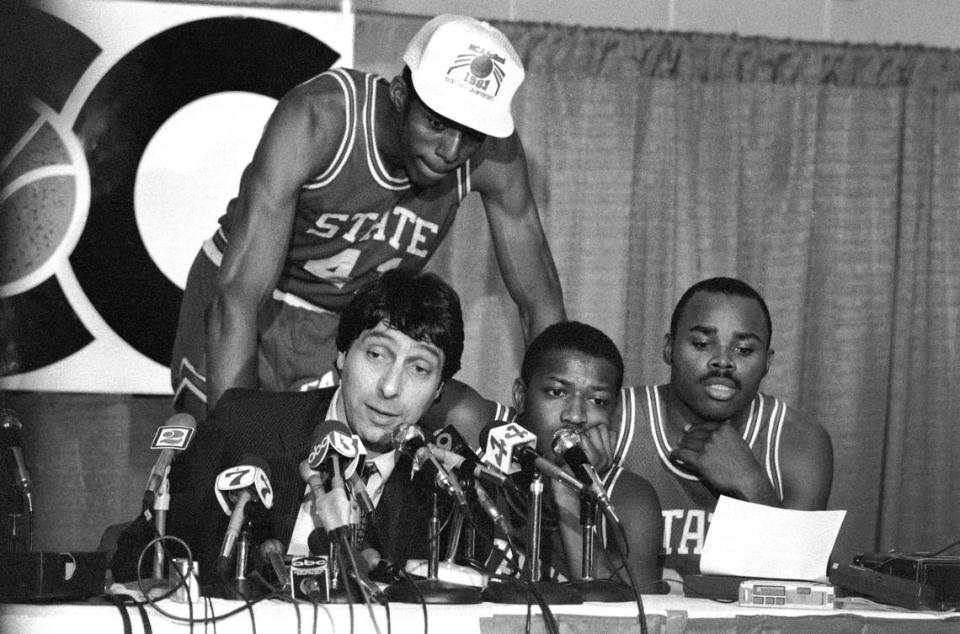
The conference of Gary Williams, flummoxed with the influence of the North Carolina schools, claiming Maryland might as well be Alaska. (And yes, Gary: the conference of Lefty Driesell, too.)
What is the identity of ACC basketball, now, aside from the one built on the past? In the present, the conference is trying to rebuild after two consecutive abysmal seasons. Only five ACC teams made the 2022 NCAA tournament, prompting an outcry within the league, and then only five league teams made the tournament, again, last March. Four of the 10 teams that made it the past two seasons barely earned bids, as No. 11 seeds, and another entered as a No. 10 seed.
The future of the conference remains murky, too, with the specter of defections. And in basketball the league doesn’t even know what the conference tournament, long the ACC’s signature event but one that has lost considerable luster in recent years, might look like beyond this season. If it has come to feel to coaches as though they have little control over the direction of the league, as if they’re beholden to football at the expense of everything else, well, there’s a good reason for that.
“A lot of the decisions as you guys know are based on football,” Kevin Keatts, the N.C. State coach, said last week in Charlotte. And indeed, the pursuit of strength in that one sport has affected the fate of every other. ACC men’s and women’s basketball teams have combined to win 18 NCAA championships. The passion of the league’s rivalries, and among its fans, became the envy of rival leagues throughout the country. Now all that history matters little, if at all.
‘We are a national conference’
On a recent warm and sunny late October Tuesday, a moving van waited outside the ACC’s old Greensboro offices, just off of John Swofford Way. The parking lot for the building where the conference conducted business for 26 years was now nearly empty; the poles from which the ACC’s flags once flew were now bare. The move-out and departure looked almost complete.
A Mack truck loaded a dumpster full of boxes. Movers milled about the front doors, propped open, workers clearing whatever was left inside. The conference in August opened its new headquarters, in an uptown Charlotte high-rise. In Greensboro, all that was left of the ACC was its old home in a nearly-vacant office park, along with decades of memories and emotional ties.
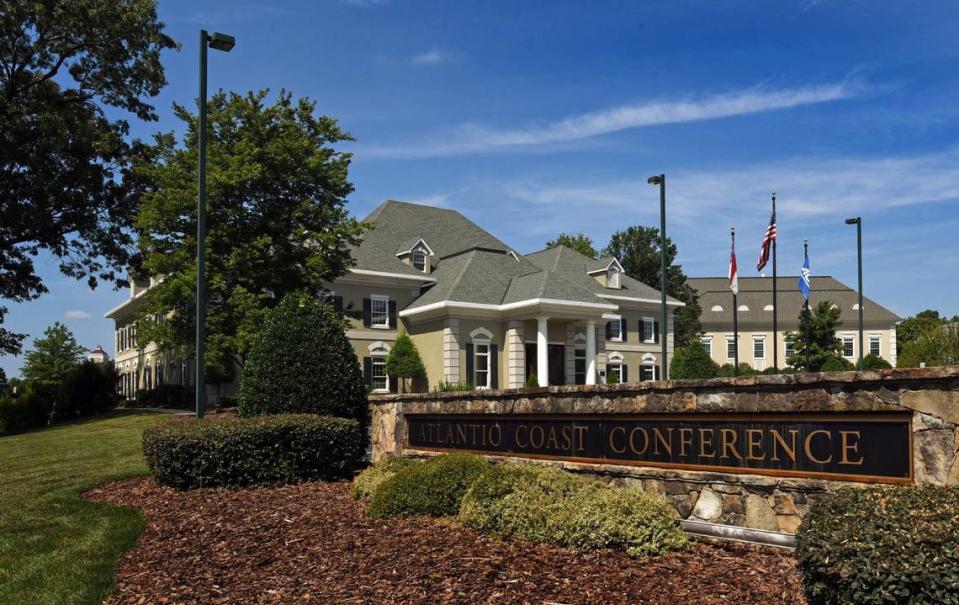
On the same Tuesday, about 90 miles south down Interstate 85, the conference hosted the first of its annual basketball media days at the Charlotte Hilton. Coaches and players from the ACC’s women’s teams met with media members and early the next morning, Jim Phillips, the league’s commissioner, provided his annual pre-basketball-season state-of-the-conference address.
It was Phillips’ most visible public appearance since he led the ACC’s decision to expand. After a month of debate and behind-the-scenes politicking, the conference on Sept. 1 announced the impending additions of Cal, Stanford and SMU, and Phillips spent much of his time defending and promoting the move.
“I’ve never been more confident in the league than what we just went through over the last three or four months,” he said, referencing a time frame that began, in May, with creating a new revenue distribution model and ended, in early September, with the decision to expand. Of that, Phillips said, “We are a national conference.”
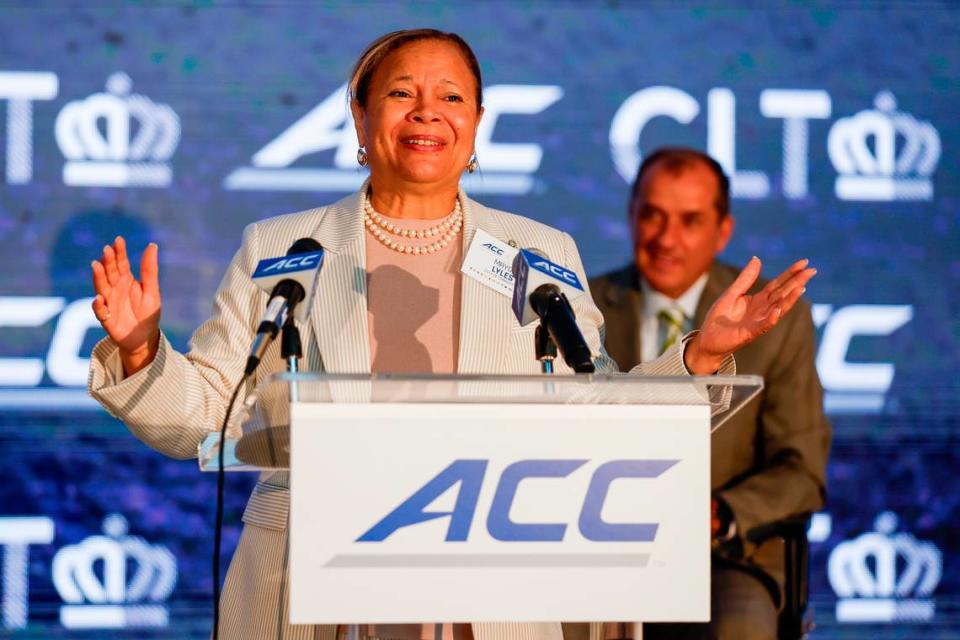
“We’ve been a regional conference. Two years ago would we have done this? Probably not, but times have changed, and you either get on the offensive or you don’t. Where is the health of the league? The league is healthy. The league is healthy.
“At the end of the day, my job is to run the ACC and make sure it’s healthy for the next 70 years as it has been the last 70 years. I cannot control individual feelings on campuses, but we have addressed head-on anything that our campuses have indicated.
I feel great. I really do. I’ve never been more bullish. I can’t say that I felt that way a year ago.”
To expansion advocates, Phillips included, the addition of two California schools and another from Dallas became an obvious and necessary move. The hope, for optimists, is that expansion has solidified the ACC for years to come; that it has secured the conference’s place at the table of major college athletics, and that it might allow the league to withstand defections of its own.
To expansion critics, including some of the ACC’s membership, the move was reactive, unnecessary and one that might cause further destabilization. Maybe the schools who opposed expansion — North Carolina and Florida State, among them — will leave the ACC eventually, anyway. But perhaps expansion helps hasten their exits.
The ACC’s next challenge
After a debate that lasted almost all of August, expansion won out. “City Hall,” as Hamilton put it. No use in fighting. He and his colleagues enter this season seeking to reverse the decline the conference has experienced during the past two. Duke and North Carolina reached the Final Four in 2022 and Miami did the same a season ago but with several weak teams in the middle and bottom of the league standings, the ACC has fought a perception battle unlike any in its history. The additions of Cal, Stanford and SMU only hurt.
Cal was arguably the worst major-conference team in the country last season, perhaps even worse than Louisville. The Golden Bears won three games, one of which was against Stanford. The Cardinal also finished with a losing record (14-19) and so did SMU (10-22).
The three teams have combined for four NCAA Tournament appearances over the past 10 years and, barring dramatic improvement, they will further bring down the same metrics that have damaged the ACC’s reputation and postseason prospects. The league will, though, stand to make a little more television money. There will be more inventory for the networks, along with the cross-country road trips, and isn’t that what college sports is all about these days?
It is not so much about the rivalries, or what went on for so long in places like Reynolds or Carmichael or Cole; it is certainly not about preserving any sport at the expense of the one that now rules all. The reality has long been understood.
“Sitting still is not the answer,” Jon Scheyer, the second-year Duke coach, said recently of the ACC’s impending expansion. “And doing nothing is not the answer. You know, I think getting those three schools, it sounds foreign, right, because you grow up in the ACC and you think about SMU and Cal and Stanford, but a lot of what’s happening is foreign.”
In that context, Scheyer called the additions “necessary.”
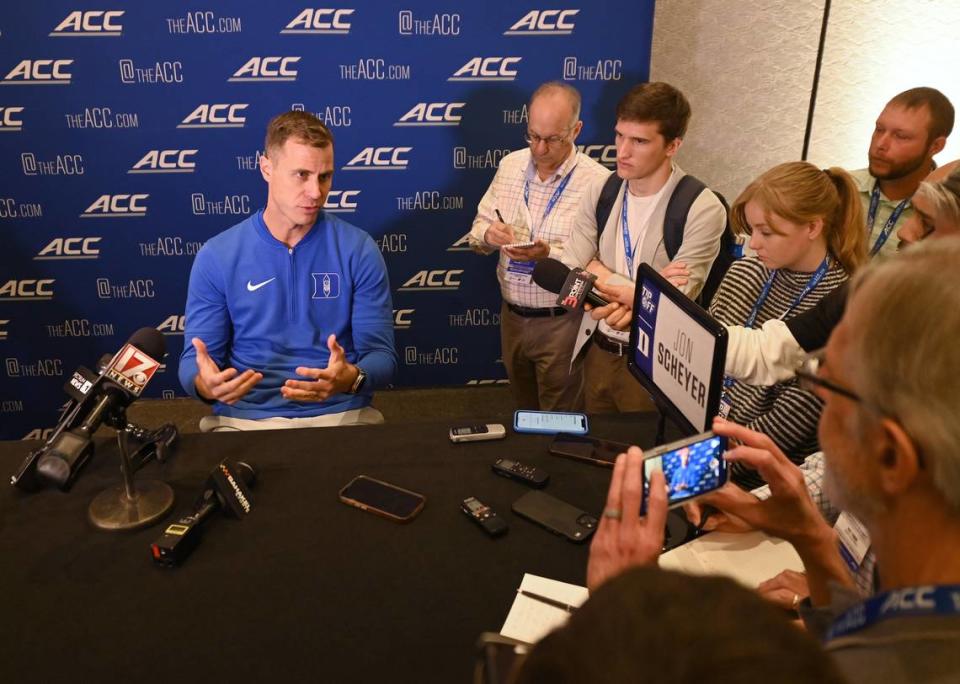
He drew a crowd of reporters last Wednesday, just as his predecessor, Mike Krzyzewski, did for decades at these events. Krzyzewski retired in 2022, with former North Carolina coach Roy Williams retiring in 2021 and former Syracuse coach Jim Boeheim retiring after last season. Three Hall of Fame, national championship coaches, with a combined 127 years of head coaching experience, gone. Their absences, too, have contributed to the ACC’s basketball identity crisis.
Nine of the league’s 15 head coaches have been in their positions five seasons or fewer; seven enter this season with no more than two seasons of ACC head coaching experience. Krzyzewski was the last remaining member of the conference’s old guard; the last who experienced ACC basketball for what it was, at its best.
The new guard, at least, has regular trips to the West Coast to anticipate and, in the meantime, the challenge of restoring some pride the ACC has lost in recent years.


